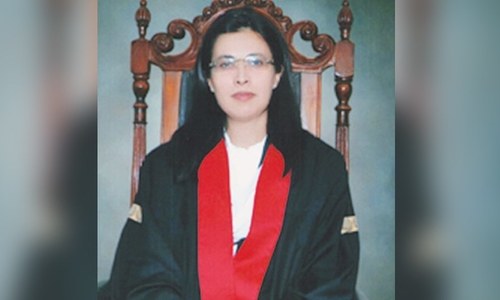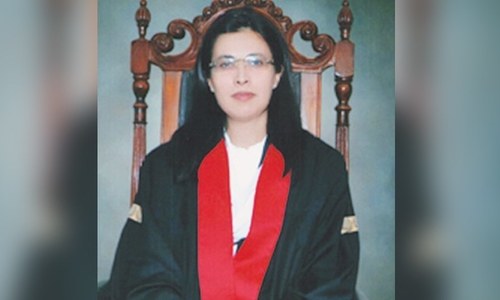
ISLAMABAD: Lack of consensus during an extended meeting on Thursday led the Judicial Commission of Pakistan (JCP) to reject the elevation of Justice Ayesha A. Malik, who is fourth on the seniority list of the Lahore High Court (LHC), to the Supreme Court as the first-ever woman judge in the country’s judicial history.
The JCP met at the Supreme Court building for around four hours amid lawyers’ protest and convention in the nearby Supreme Court Bar Association (SCBA) complex, accusing the judiciary of favouritism in the appointment of superior court judges and thus harming the image of the judiciary.
Four out of eight members of the JCP — Justice Maqbool Baqar, Justice Sardar Tariq Masood, former judge Dost Mohammad Khan and Pakistan Bar Council (PBC) representative Akhtar Hussain — opposed the appointment of Justice Ayesha Malik, whereas Chief Justice of Pakistan Gulzar Ahmed, Justice Umar Ata Bandial, Law Minister Barrister Dr Farogh Naseem and Attorney General for Pakistan (AGP) Khalid Jawed Khan favoured it. Justice Qazi Faez Isa, another JCP member, was away from the meeting because of the treatment of his wife Sarina Isa.
An informed source confided to Dawn that no consensus was reached at the meeting which ended without taking a decision on the appointment.
Four commission members oppose, as many favour appointment of Justice Ayesha amid lawyers’ protest
“Though it is a clear rejection, it does not mean that the suggestion could not be reconsidered in future,” commented former AGP Aushtar Ausaf.
PBC representative Akhtar Hussain also described the decision as rejection, saying the meeting deliberated at length on adherence to the seniority principle in the elevation of judges. “We believe that instead of Justice Ayesha Malik, who is a junior judge, Justice Mussarat Hilali, also fourth on the seniority list of the Peshawar High Court, should be considered to become a woman judge of the Supreme Court.”
He said it was a stand of the PBC that women should be appointed as judges in large number in the lower judiciary as well as in the five high courts. Today’s decision of the JCP should not be construed as a victory for the lawyers but in favour of the stand taken by them for upholding the seniority principle in the appointment of judges.
A senior counsel on condition of anonymity, however, said this was for the first time that the CJP’s suggestion could not be carried over as against the past practice when such suggestions forwarded by the CJP office were usually approved.
Out of total strength of 17 judges, he envisaged, the Supreme Court would continue functioning with the existing 16 judges as after Thursday’s episode, the JCP may not meet in the near future.
During the meeting, the AGP suggested deferring the decision on the elevation of Justice Ayesha Malik till the next meeting and in the meanwhile the CJP should consider the names of woman judge from each high court for the appointment in the future meeting of the commission. However, his suggestion was not considered.
The AGP also asked for considering allocation of number of seats or quota for the appointment of judges from the five high courts to the Supreme Court in the next meeting of the JCP and said the commission should decide and resolve that there should at least be one seat, with possibility of more in future for women as judges of the apex court.
Earlier in the morning, the SCBA arranged a protest demonstration on the Constitution Avenue outside the Supreme Court gates and then held the convention at Asma Jehangir Auditorium in the SCBA complex. The protesting lawyers also boycotted court proceedings and chanted slogans against the judiciary outside the court.
Although the convention was addressed by PBC vice chairman Khushdil Khan, SCBA president Abdul Latif Afridi, Sindh High Court Bar Association president Salahuddin Ahmed and many others, the star of the show was popular Ali Ahmed Kurd who addressed the gathering amid standing ovation and applause and anti-judiciary slogans.
The convention, held under the auspices of the PBC and SCBA, was joined by the representatives of all provincial bar councils, Islamabad Bar Council, high court bar associations and district and tehsil bar associations.
A resolution adopted at the conclusion of the convention regretted the growing perception that different affairs of the judiciary were not being conducted with the desired level of independence, impartiality and neutrality, creating a crisis of confidence in the judicial institution.
It asked the JCP to strictly adhere to the seniority principle in appointments to the apex court until fair, transparent and objective criteria for appointment of judges at all levels were framed in consultation with all stakeholders, including the bar, and appropriate amendments to the Judicial Commission Rules.
“The unfettered and unstructured exercise of discretion is a recipe for the abuse of power whether exercised in the appointment of judges or constitution of benches, fixing of cases or initiation of suo motu proceedings and the same must be duly regulated through rules and guidelines if public confidence in the apex court is to be maintained,” the resolution said.
The convention demanded that Article 175(A) be amended to reduce the monopoly of judges over the JCP and enhance the representation of other stakeholders, especially the bar, on the basis of parity.
The resolution also demanded immediate withdrawal of the Pakistan Media Development Authority (PMDA) bill which, it said, was aimed at putting curbs by controlling the media.
The convention demanded that parliament undo the judgement passed by Justice Musheer Alam, which rendered more than 17,000 employees jobless. It also asked for a complete ban on all forms of reappointments after retirement.
The resolution condemned the passage of the amendment bill by the National Assembly in relation to Section 5(d) of the Legal Practitioners and Bar Councils Act 1973, whereby members already appointed to different posts in the service of Pakistan on the basis of their legal experience have been provided a cover to continue as members of their respective bar councils and associations and enjoy voting rights and a right to be considered against all judicial and other legal posts and elevations which otherwise reserved for practicing lawyers.
“This has been done to bestow additional favours upon the blue-eyed ones of the government and also to influence the electoral process and independence of the bar councils and associations,” the resolution said. It also demanded an act for the protection of lawyers.
Meanwhile, the lawyers in Karachi also boycotted court proceedings in protest against what they called repeated and unjustified deviation from the seniority principle in appointments judges to the apex court.
Published in Dawn, September 10th, 2021


































